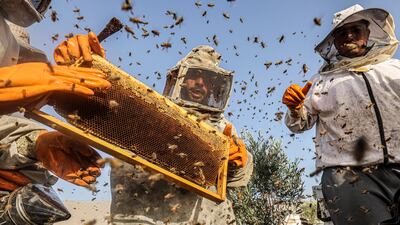Wild swings in the weather have cut honey production in the Gaza Strip by nearly half this year and are threatening the territory’s bee population with high and low temperatures outside the normal historical range.
Gaza has only one honey-producing season, which begins with the onset of warmer weather in March and lasts until the first week of May. But this year the weather stayed cold with unexpected downpours until the second week of April, and then became unusually hot.
The prolonged cold affected the blossoming of Gaza’s many citrus orchards and vegetable crops, leaving the bees with fewer flowers from which to collect nectar when the weather turned warmer and then too hot.
“Our bees were kind of confused, as if they were asking: shall we stick to our beehives to keep ourselves cool since it is unusually hot? And where are the flowers to get our nectar as we used to do?” said beekeeper Bisan Al Khawaja, who owns 50 beehives in Beit Lahia, in the northern Gaza Strip.
“My bees were, like, motionless. They couldn’t move from one plant to another,” Mrs Al Khawaja, 28, told The National.
She was able to harvest only about 70 kilograms of honey from her hives compared with 150kg last year because the bees had to feed on their stored honey while the weather stayed cold.
Overall, Gaza has produced only 140 tonnes of honey this year, a sharp drop from the 200 tonnes produced last year.
There are nearly 500 registered beekeepers in the Gaza Strip, according to the Agriculture Ministry, although some Gazans take up beekeeping as a hobby or to produce honey for family consumption or to sell on a small scale.
All of Gaza’s honey production is consumed locally.
The number of beehives in the Palestinian enclave has dropped dramatically, from 35,000 in 2000 to fewer than 20,000 in 2021, mainly as result of Israel's military incursions into farmland along the border, according to the Gaza Beekeeping Association.
Israel says such operations, when bulldozers raze farmlands to create a buffer zone up to hundreds of metres deep along the approximately 50-kilometre border, are important for its national security.
Honey bees are important for the environment and ecosystem, as are other pollinating insects that many plants rely on to reproduce.
The UN estimates that more than three quarters of the world’s main food crops rely to some extent on bees and other pollinators and has expressed concern at the decline and disappearance of bees and wild insects, mainly the result of climate change, pesticides and plant diseases.
“The Gaza Strip normally has just one season of honey production as honey bees wait every year for the spring ― unlike other countries that have more than one season, depending on weather ― and of course that might have changed as well because of the global climate change,” says Mohamed Hussein, an agricultural engineer who advises the agriculture ministry and is a lecturer at Al Azhar University in Gaza.
“Bees can fly in a limited range, between one and six kilometres, and they badly need to drink nectar for their own survival and collect pollen for their nests,” Mr Hussein told The National.
“So, to put it in plain terms, it’s a mutual relationship: the bees benefit from us planting and not polluting the environment, and we get our food from them when they pollinate the flowers.”
Honeybees pollinate most of Gaza's crops, including lemon, orange and tomatoes.
The territory of about 365 square kilometres on the eastern Mediterranean coast is known for its fertile land and varied crops, especially olives, grapes and citrus fruits.
With most economic activity affected by an Israeli blockade imposed after the Palestinian militant group Hamas took power in 2007, many people depend on agriculture to survive.
According to the World Bank, more than 50 per cent of Gaza’s population of two million live in abject poverty.

Climate change raises concerns not just about Gaza’s agriculture but also the extinction of its bee population.
Essam Jarradah, whose family lost all their hives during an Israeli incursion in 2020, suffered another setback this year as the extreme weather affected his bees.
“They took a lot of days off and they aren’t lazy workers or creatures at all,” Mr Jarradah, 61, told The National.
He said he inherited his passion for bees and honey-making from his father and grandfather and was keen to pass it on to his children and grandchildren.
After losing about 400 beehives across Gaza since 2000, Mr Jarradah started anew last year with 100 beehives in Beit Hanoun, in north-east Gaza. His honey production was only half of the 300kg he expected.
Seeing the big picture, he decided to prepare for the man-made climate risks, mainly by covering the hives with oak bark to acclimatise them in cold weather.
“I decided to leave the honey to the bees to feed themselves this season and hopefully develop my business and enlarge my beehives with more swarms to take the total number to 200 and distribute them in different parts of Gaza, close to the farms,” he said.
“Sadly, some bees couldn’t make it past the cold part of April and March this year because they starved after they ran out of honey stores and due to the lack of nectar in weak flowers that didn’t bloom properly. It breaks my heart to see bees die in droves.”







